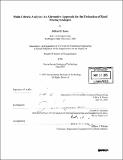Multi-criteria analysis : an alternative approach for the evaluation of road pricing strategies
Author(s)
Ensor, Jeffrey D. (Jeffrey Douglas)
DownloadFull printable version (14.41Mb)
Alternative title
Alternative approach for the evaluation of road pricing strategies
Other Contributors
Massachusetts Institute of Technology. Dept. of Civil and Environmental Engineering.
Advisor
Joseph M. Sussman.
Terms of use
Metadata
Show full item recordAbstract
Interest in road pricing among political leaders, transportation analysts, academics, and government agencies has increased in recent years. There are myriad reasons for this newfound consideration, but the deployment of intelligent transportation systems, the desire for additional revenue sources, and the search for policies that can reduce congestion are among the most important. This thesis examines the impacts of six different types of road pricing strategies, namely: conventional tolling, facility congestion pricing, express lanes (e.g. HOT lanes), area- wide and cordon pricing, network pricing, and distance-based pricing. It also presents a new sketch-planning model, the Road Pricing Decision Analysis Tool (RPDAT), which highlights each strategy's unique set of strengths and weaknesses for achieving different policy objectives and recommends road pricing strategies for particular metropolitan areas. Despite a growing interest in pricing, many decision makers feel unable to estimate the impacts of pricing strategies accurately with conventional models. This thesis discusses the factors believed to be responsible for drivers' choosing to use priced facilities, explains why conventional models are incapable of capturing many of these factors or the aggregate effects of a pricing policy, and identifies some improvements that could be made to existing transportation models. RPDAT performs a multi-criteria analysis of nine road pricing strategies, one of which is a "no pricing" alternative, for a metropolitan area. The user inputs policy priorities and regional characteristics, and RPDAT's algorithms calculate how well each alternative meets the decision maker's criteria as well as index scores that reflect the overall preference for each alternative. This tool is applied to Kuala Lumpur (KL), Malaysia and is used to recommend road pricing strategies for the KL metropolitan area.
Description
Thesis (S.M.)--Massachusetts Institute of Technology, Dept. of Civil and Environmental Engineering, 2005. Includes bibliographical references (p. 197-205).
Date issued
2005Department
Massachusetts Institute of Technology. Department of Civil and Environmental EngineeringPublisher
Massachusetts Institute of Technology
Keywords
Civil and Environmental Engineering.